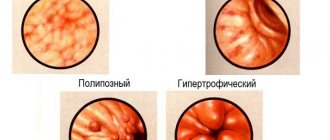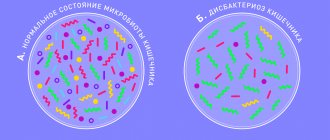The article was checked by a gastroenterologist, endoscopist Kondrashova E.A., is for general informational purposes only and does not replace specialist advice. For recommendations on diagnosis and treatment, consultation with a doctor is necessary.
At the Clinical Hospital on Yauza, they will quickly find out the cause of poor appetite and other disorders and carry out successful treatment. Qualified doctors - consultants of various profiles, modern examination technologies and expert equipment (ultrasound, endoscopy, endosonography, CT and MRI, all laboratory diagnostics, etc.), an individual approach to each patient ensure the effectiveness of treatment of diseases accompanied by appetite disorders.
Types and causes of occurrence
Loss of appetite can be absolute (anorexia), partial (hyporexia) and reduced (eating food, but in small quantities with a constant feeling of hunger). At the initial appointment, the doctor at the Kuntsevo Medical and Rehabilitation Center identifies one of these reasons that caused the loss of appetite:
- diseases of the intestines, stomach, gall bladder, pancreas,
- infectious diseases,
- helminthic infestations.
In addition, experts note psychological instability and the use of certain medications as the cause of loss of appetite.
Diagnostics
Lack of appetite is observed in many diseases, so the primary examination of the patient is carried out by a general practitioner. To select a set of instrumental and laboratory studies, it is necessary to carefully collect complaints and the history of the development of the disease, and identify the leading pathological syndrome. Next, specific diagnostic methods are prescribed, the most informative of which are:
- Blood analysis
. A standard blood test shows signs of inflammation and anemia, which often indicate a neoplastic cause. Biochemical analysis reveals changes in liver function and decreased excretory function of the kidneys. If the lack of appetite is caused by an infectious process, serological tests are performed to identify the pathogen. - Coprogram
. Macroscopic analysis evaluates the consistency and color of stool, signs of malabsorption syndrome. On microscopic examination, the levels of leukocytes and erythrocytes are elevated, which is a manifestation of inflammatory bowel disease. To establish a diagnosis of dysbacteriosis, stool culture is done. To exclude bleeding, the Gregersen reaction is indicated. - Visualization methods
. Since in adults, lack of appetite is often associated with chronic damage to the gastrointestinal tract, ultrasound of the abdominal cavity, targeted scanning of individual organs, contrast radiography, and FGDS are performed. For renal dysfunction, excretory urography is recommended. To detect tumors and destructive processes, ultrasound of the thyroid gland and adrenal glands is used; in women, the ovaries are visualized. - Neurological examination
. After a standard clinical examination (assessment of eye and tendon reflexes, muscle tone, cognitive functions), additional methods are used. An MRI of the brain is informative, which allows you to detect tumors or other disorders in the area of the sella turcica. If necessary, the patient is referred for consultation to a psychiatrist.
Ultrasound examination is indicated in case of lack of appetite
Which doctor treats loss of appetite
There is no need to ignore such a symptom as decreased appetite. With this problem you need to contact a gastroenterologist.
To make an appointment, choose any method:
- call the clinic +7 (495) 103-99-55,
- order a call back,
- leave a request for an appointment using a convenient form on the website:
Loss of appetite may indicate the development of various pathologies in the patient’s gastrointestinal tract: from helminthic infestation to infectious lesions and disorders at the enzymatic level.
IMPORTANT! In any case, persistent loss of appetite requires consultation with a specialist from the Kuntsevo Medical and Rehabilitation Center. Our experienced gastroenterologists will conduct a full diagnosis to determine the source of the symptom in order to then eliminate the found cause.
Make an appointment with a gastroenterologist at our center - and regain your previous quality of life, without unpleasant alarming symptoms!
SIGN UP
How to increase appetite in an adult, reasons for decreased appetite
When your appetite is good, you don’t think about your health. Emerging problems with appetite or lack of it, apathy, can be a signal of imbalance, imbalance in the body, and sometimes the development of serious diseases and complications. For some, excess weight is a problem, for others, thinness is a problem. Therefore, it is also important for them to normalize weight, restore appetite and stabilize the process of food digestion.
Consequences of long-term eating disorders
As already mentioned, long-term deviations in eating behavior can lead to either obesity or dystrophy, that is, depletion of the body. Consequences may also be:
- sleep disorders;
- decreased immunity due to lack of nutrients necessary for the body;
- the appearance of cracks or stretch marks on the skin (with rapid growth of adipose tissue);
- disruption of the activity of internal organs; Source: E.V. Pavlovskaya Selective appetite in children // Issues of modern pediatrics / 2013/ Volume 12/ No. 6
- depression of brain activity (decreased memory and speed of thinking).
Treatment prices:
| Service | Price, rub) |
| Consultations | |
| Consultation with a psychologist in person | 6 000 ₽ |
| Consultation with a psychologist online | 5 000 ₽ |
| Full-time course (4/month) | 22 000 ₽ |
| Online course (4/month) | 18 000 ₽ |
| Consultation with a narcologist | 3 000 ₽ |
| Consultation with a psychiatrist in person | 6 000 ₽ |
| Online psychiatrist consultation | 5 000 ₽ |
| Consultation with the head physician | 10 000 ₽ |
| Psychodiagnostics / pathological diagnostics | 7 500 ₽ |
| Family psychotherapy | 7 000 ₽ |
| Intervention session | 12 000 ₽ |
| Help for relatives | |
| Support groups for loved ones of addicts | for free |
| Webinars for relatives of addicts | for free |
| School for codependents 1 month | 5 000 ₽ |
| Motivating an addict for treatment | 6 000 ₽ |
| Accompanying the patient to the clinic | 6 000 ₽ |
| Advanced hospitalization | 15 000 ₽ |
| Service | Price, rub) |
| Rehabilitation | |
| Social rehabilitation of addicts | specify |
| Basic rehabilitation program | 40 000 ₽ |
| Standard rehabilitation program | 75 000 ₽ |
| Intensive rehabilitation program | 100 000 ₽ |
| Premium rehabilitation program | 350 000 ₽ |
| Online rehabilitation for addicts | 39 000 ₽ |
| Outpatient rehabilitation in Moscow | 55 000 ₽ |
| Rehabilitation of age-related alcohol addicts | 75 000 ₽ |
| Adolescent social-psychological-pedagogical rehabilitation | 60 000 ₽ |
| Rehabilitation Montenegro, Israel | 300 000 ₽ |
| Medical and social rehabilitation (14-21-28 days) | 90 000 ₽ |
| Transfer support | negotiable |
| Analyzes | |
| Drug testing urine analysis | 2 500 ₽ |
| Drug testing blood test | 12 500 ₽ |
| Hair drug test 3 months | 18 000 ₽ |
Expand
We will select an individual treatment plan
Free consultation 8-800-200-27-23
Acid reflux
Gastroesophageal reflux disease (GERD), also called acid reflux, is another digestive disease that can reduce your appetite.
People with GERD experience constant heartburn - the contents of their stomach may return to the esophagus after eating. They may wake up in the middle of the night with a sour taste in their mouth, which may prevent them from eating. Their throat may also become irritated, even to the point of developing Barrett's esophagus.
Intoxication
The reasons for the occurrence and development of intoxication of the body are extremely numerous, and the situations in which they arise can be divided into two categories: subjective, depending directly on the actions of the patient (smoking, drinking alcohol, taking medications, accidentally or intentionally taking various chemicals, etc.) , and objective, caused by the current specific situation in everyday life, at work or by the development of chronic or acute diseases of any organs. Moreover, the presence of a toxin cannot always be detected by tests.
What is anorexia?
This is an eating disorder, which is characterized by a lack of acceptance of one’s appearance, an aversion to food, as well as the desire to lose “extra” weight by all means (eliminating food, inducing vomiting, taking laxatives and diuretics). Very often, the disorder occurs against the background of schizophrenic and psychopathic disorders, and also accompanies diseases of the gastrointestinal tract.
It is noteworthy that anorexia practically does not occur among the stronger sex. This suggests that girls, young women and women are too critical and also perceive criticism regarding their figure quite sharply. The obsessive propaganda of slimness and thinness in the media aggravates the situation.
According to the international classification, anorexia is considered a behavioral syndrome and not a neurotic disorder. Consequently, the phenomenon can be considered a pathological change in behavior, which can cause irreparable harm to health.
6-time menu for quick recovery
One of the most useful menu options for a patient with ARVI may look like this:
- On the first day of tomorrow they eat oatmeal cooked in milk and drink tea with lemon.
- Second tomorrow - steamed omelette and rosehip drink.
- For lunch, you can eat a steamed meatball, half a serving of rice porridge and vegetable soup with chicken broth (half a plate). Dessert – compote with grated fruit.
- In the afternoon it will be enough to eat a baked apple.
- For dinner, boiled potatoes with stewed fish, vinaigrette and tea with honey go well.
- The last meal an hour before bedtime is a fermented milk drink (for example, kefir).
Nutrition during a cold should be balanced, enhanced with proteins, vitamins and microelements. If the patient has chronic digestive disorders and other diseases, it is better to additionally consult a doctor.
Stages of anorexia
Any neurosis, including anorexia, develops gradually. The trouble is that a person skillfully hides his disorder, and when the truth is revealed, it becomes extremely difficult to help him.
First stage of anorexia
The first stage can last several years. During this time, the patient completely changes his worldview, begins to feel burdened by extra pounds (sometimes non-existent), and thinks through options for losing weight. He is increasingly burdened by his own figure, and any careless hint or joke can lead to disaster.
Anorexic stage
Anorexia neurotic enters the active stage - the person begins to take measures to lose weight. First, all “bad” foods are eliminated, and the body begins to rapidly get rid of excess fluid and fat. Then the weight loss process stops, and therefore the patient takes more drastic measures - he completely refuses to eat. This stage can arise as a result of a mental disorder, bypassing the first stage. Losing weight due to depression is a standard phenomenon.
Cachexia stage
Wear and tear of almost all organs - heart, liver, kidneys, brain, blood vessels. The patient becomes lethargic, inactive, and is constantly freezing. At this stage, treatment is quite long and difficult. The body switches on maximum energy saving mode, so menstruation stops, hair and teeth begin to fall out.
Extinction stage of anorexia nervosa
The nervous system suffers, all systems begin to fail. At this stage, death is possible, and changes in health may be irreversible. As a rule, a person is placed under IVs and machines to support vital functions and replenish the lack of nutrients.









